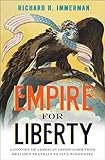Empire for Liberty : A History of American Imperialism from Benjamin Franklin to Paul Wolfowitz / Richard H. Immerman.
Material type: TextPublisher: Princeton, NJ : Princeton University Press, [2010]Copyright date: ©2010Description: 1 online resource (288 p.) : 6 halftonesContent type:
TextPublisher: Princeton, NJ : Princeton University Press, [2010]Copyright date: ©2010Description: 1 online resource (288 p.) : 6 halftonesContent type: - 9780691156071
- 9781400834280
- online - DeGruyter
- Issued also in print.
| Item type | Current library | Call number | URL | Status | Notes | Barcode | |
|---|---|---|---|---|---|---|---|
 eBook
eBook
|
Biblioteca "Angelicum" Pont. Univ. S.Tommaso d'Aquino Nuvola online | online - DeGruyter (Browse shelf(Opens below)) | Online access | Not for loan (Accesso limitato) | Accesso per gli utenti autorizzati / Access for authorized users | (dgr)9781400834280 |
Browsing Biblioteca "Angelicum" Pont. Univ. S.Tommaso d'Aquino shelves, Shelving location: Nuvola online Close shelf browser (Hides shelf browser)

|

|

|

|

|

|

|
||
| online - DeGruyter Makers of Ancient Strategy : From the Persian Wars to the Fall of Rome / | online - DeGruyter A Short History of the Jews / | online - DeGruyter The Rebbe : The Life and Afterlife of Menachem Mendel Schneerson / | online - DeGruyter Empire for Liberty : A History of American Imperialism from Benjamin Franklin to Paul Wolfowitz / | online - DeGruyter The Rise and Fall of Modern American Conservatism : A Short History / | online - DeGruyter Nothing Less than Victory : Decisive Wars and the Lessons of History / | online - DeGruyter The Tyranny of Guilt : An Essay on Western Masochism / |
Frontmatter -- Contents -- Acknowledgments -- Introduction:Contending with the American Empire -- Chapter 1. Benjamin Franklin and America's Imperial Vision -- Chapter 2. John Quincy Adams and America's Tortured Empire -- Chapter 3. William Henry Seward Reimagines the American Empire -- Chapter 4. Henry Cabot Lodge and the New American Empire -- Chapter 5. John Foster Dulles and the Conflicted Empire -- Chapter 6. Paul Wolfowitz and the Lonely Empire -- Postscript: The Dark Side -- Notes -- Index
restricted access online access with authorization star
http://purl.org/coar/access_right/c_16ec
How could the United States, a nation founded on the principles of liberty and equality, have produced Abu Ghraib, torture memos, Plamegate, and warrantless wiretaps? Did America set out to become an empire? And if so, how has it reconciled its imperialism--and in some cases, its crimes--with the idea of liberty so forcefully expressed in the Declaration of Independence? Empire for Liberty tells the story of men who used the rhetoric of liberty to further their imperial ambitions, and reveals that the quest for empire has guided the nation's architects from the very beginning--and continues to do so today. Historian Richard Immerman paints nuanced portraits of six exceptional public figures who manifestly influenced the course of American empire: Benjamin Franklin, John Quincy Adams, William Henry Seward, Henry Cabot Lodge, John Foster Dulles, and Paul Wolfowitz. Each played a pivotal role as empire builder and, with the exception of Adams, did so without occupying the presidency. Taking readers from the founding of the republic to the Global War on Terror, Immerman shows how each individual's influence arose from a keen sensitivity to the concerns of his times; how the trajectory of American empire was relentless if not straight; and how these shrewd and powerful individuals shaped their rhetoric about liberty to suit their needs. But as Immerman demonstrates in this timely and provocative book, liberty and empire were on a collision course. And in the Global War on Terror and the occupation of Iraq, they violently collided.
Issued also in print.
Mode of access: Internet via World Wide Web.
In English.
Description based on online resource; title from PDF title page (publisher's Web site, viewed 29. Jul 2021)


